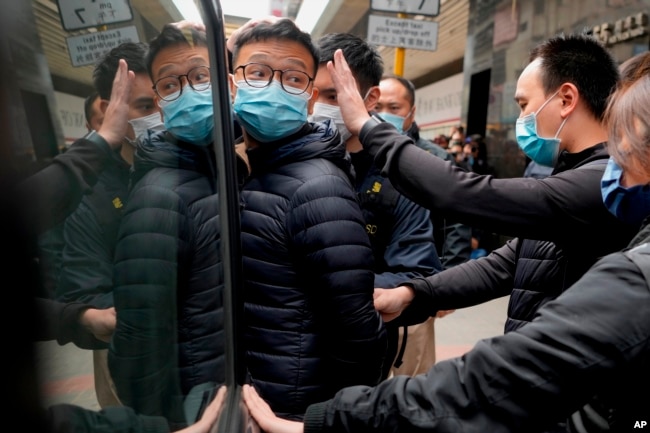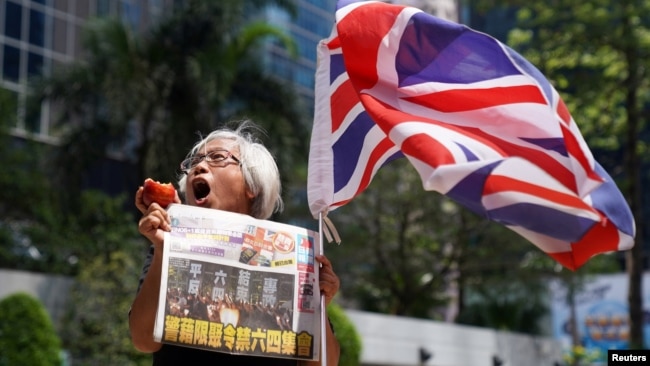民主主義、生まれた時から空気のように感じている自由、人権。
これが無くなったら。。。。
VOAで英語を学び、世界を見つめましょう!!
2021年、香港のメディアは大きな変化に直面した(和訳)
Hong Kong Media Faced Big Changes in 2021
香港では、法執行当局が水曜日にメディア企業であるStand News の閉鎖を強行し、家宅捜索で6人の現職または元職員を逮捕しました。
報道によると、従業員は "扇動的出版 "の疑いで起訴されたとのことです。スタンドニュースは、2014年に非営利のメディア企業として設立されました。6月にApple Dailyが閉鎖された後、香港の民主化を支援する出版物として知られていました。警察は事業者の金品も押収しました。

Editor of Stand News Patrick Lam, center, is escorted by police officers into a van after they searched evidence at his office in Hong Kong, Dec. 29, 2021. (AP)香港のオフィスで証拠品を捜索した後、警察官に付き添われてバンに乗り込むスタンドニュースのパトリック・ラム編集長(中央)(2021年12月29日撮影)。(AP通信)
警察は、スタンドニュースの現職または元職員6人を逮捕したほか、活動家で人気歌手のデニス・ホーも逮捕しました。彼女はメディア企業の元役員で、扇動的な出版物の発行に関与した容疑でも起訴されました。
1997年に中国の支配に戻った旧英国植民地では、今回の家宅捜索によって報道の自由に対する懸念が高まっています。
2021年:香港のメディアにとって困難な年
2021年は、香港のメディアに大きな変化をもたらしました。
この変化は、北京で可決された同領域の国家安全保障法に大きく起因しています。
この年、記者が拘束され、Apple Daily紙が閉鎖に追い込まれ、外国人記者のビザが延期されたり、拒否されたりしたケースもありました。
香港はかつて報道の自由のモデルでした。香港はかつて報道の自由の模範とされ、国内外の記者たちが自由に抗議デモを取材していました。しかし、その同じ抗議活動が、中国本土の新しい国家安全保障法を引き起こし、中国本土が世襲や外国勢力との共謀と呼ぶものを禁止することになったのです。
香港の外国特派員協会(FCC)を含むジャーナリスト協会は、この法律の影響を懸念しています。FCCが会員を対象に毎年行っている意見調査によると、84%がこの法律が施行されてから状況が悪化したと考えています。
我々はもう元には戻れない
ロンソン チャン氏は香港ジャーナリスト協会の会長であり、ニュースサイトStand Newsの編集者です。報道によると、彼は水曜日には逮捕されなかったといいます。
「私たちは決して元に戻ることはできません。香港は変わってしまったのです。」「報道の自由には多くのレッドラインがあるのです。」と彼は言います。
香港で報道の自由を保つことは、香港と中国を区別する最良の方法であるとチャン氏は述べています。そして、"香港の人々にとって、良いメディアを持ち続けることは重要である "と付け加えています。
香港のキャリー・ラム最高経営責任者は、報道の自由は香港の基本法で保証されていると繰り返し発言しています。基本法は1997年に英国が香港を中国本土に返還する前に施行されました。ラム氏は、今回の逮捕とApple Dailyの閉鎖がメディアに対する攻撃であることを否定しています。彼女は、ジャーナリストは新しい法律を破らないようにする責任があると述べました。
環境の変化
Apple Dailyの創業者であるジミー・ライ氏は、会社が存続できないことを危惧していました。2021年6月、Apple Dailyは閉鎖されました。
複数の幹部が治安維持法で起訴され、会社の財政は凍結されました。その後、同社は従業員への支払いや商品・サービスの購入ができなくなりました。
ライ氏は1年以上を刑務所で過ごしました。彼は、政府のいくつかの施策に対する抗議行動に参加したことで有罪判決を受けました。また、別の罪状で裁判を待っているところです。
香港の公共放送局であるラジオ・テレビジョン香港(RTHK)もまた、編集の独立性に疑問を呈する批評家たちを納得させる変化を遂げています。
新たに就任したパトリック・リー監督のもと、同放送局はいくつかの番組を終了し、同局のオンライン・アーカイブの一部を削除し、中国の選挙制度改革について議論するレギュラー番組をラムに与えました。
RTHKの関係者はVOAに対し、編集的には独立していると語っています。
香港での変化は、中国による報道機関へのより広い弾圧を反映していると、メディア権利団体「国境なき記者団(RSF)」の12月の報告書は述べています。
中国は127人のジャーナリストを拘束しており、これは世界で最も多い数です。
RSFはまた、メディア弾圧における10の主要な問題を特定しました。その中には、検閲やプロパガンダの圧力、外国人プレスのビザ取得の困難化などが含まれています。
先月、エコノミストの中国記者であるスー・リン・ウォン氏は、就労ビザの更新を拒否されました。
例外はない
香港在住の国際ジャーナリストはVOAに、「理由はどうであれ、エコノミストの特派員を追い出すということは、どんな組織からも追放されるということだと思う」と語っています。この記者は名前を明かさないよう求めています。
エリック・ウィシャート氏はベテランジャーナリストで、外国人特派員クラブの報道の自由委員会の一員です。彼は今年初め、VOAに対し、ジャーナリストは何が当局とトラブルになるのかよく分からないと語っていました。
「私たちは香港の "レッドライン "について話しています...」ウィシャート氏はこう語ります。「それは変化する風景であり、それは誰にとっても大きな大きな挑戦です。」
Hong Kong Media Faced Big Changes in 2021
In Hong Kong, law enforcement officials forced the closure of media company Stand News on Wednesday and arrested six current or former workers in a raid.
Reports say the employees were charged with suspected “seditious publication.” Stand News was set up in 2014 as a non-profit media company. It was the best known publication supporting democracy in Hong Kong after the closure of Apple Daily in June. Police also seized the money and property of the business.
In addition to arresting six current or former employees of Stand News, police also arrested activist and popular singer Denise Ho. She was a former board member of the media company who was also charged with involvement in publishing a seditious publication.
The latest raid adds to concerns about press freedom in the former British colony that was returned to Chinese rule in 1997.
2021: a difficult year for media in Hong Kong
The year 2021 brought major changes for media in Hong Kong.
The changes came largely from a national security law for the territory that was passed in Beijing.
During the year, reporters were detained, the Apple Daily newspaper was forced to close, and visas for foreign reporters were delayed or, in one case, denied.
Hong Kong was once a model for press freedom. Protests were covered freely by local and international reporters. But those same protests led to mainland China’s new national security law, which bans what it calls secession and collusion with foreign forces.
Journalists’ associations, including the Foreign Correspondents’ Club (FCC) in Hong Kong, are concerned about the law’s effects. The FCC’s yearly opinion study of members found that 84 percent believe conditions have changed for the worse since the law came into effect.
'We can never get back'
Ronson Chan is chair of the Hong Kong Journalists Association and an editor at news website Stand News. Reports say he was not arrested Wednesday.
“We never can get back. Hong Kong has changed,” Chan said. “Freedom of press has many red lines.”
Keeping a free press in Hong Kong was the best way to differentiate between the city and China, Chan said. He added that it is “important for the Hong Kong people to still have a good media.”
Hong Kong Chief Executive Carrie Lam has repeatedly said that press freedom is guaranteed under Hong Kong’s Basic Law. The Basic Law was put in place before Britain turned Hong Kong over to mainland China in 1997. Lam has denied that the arrests and the closure of Apple Daily were an attack on the media. She said journalists have a responsibility to not break the new law.
Changing environment
Jimmy Lai, the founder of Apple Daily, feared his company could not survive. In June 2021, Apple Daily shut down.
Several executives were charged under the security law and the company’s finances were frozen. The company was then unable to pay its workers or for goods and services.
Lai has spent over a year in prison. He was convicted of taking part in protests against some government measures. He is also awaiting trial on another charge.
The city’s public broadcaster, Radio Television Hong Kong (RTHK), also underwent changes that led critics to question its editorial independence.
Under the newly appointed director, Patrick Li, the broadcaster ended some shows, removed part of the station’s online archive, and gave Lam a regular show to discuss China’s electoral reforms for the city.
RTHK officials told VOA it is editorially independent.
The changes in Hong Kong reflect a wider crackdown by China on the press, says a December report by media rights group Reporters Without Borders (RSF).
China has 127 journalists in detention, the most in the world.
RSF also identified 10 main issues in media suppression. They include censorship and propaganda pressure, and increased difficulty for foreign press in securing visas.
Last month, Sue-Lin Wong, China reporter for The Economist, was denied a work visa renewal.
No exceptions seen
“I think whatever the reason, kicking out an Economist correspondent means they would expel anyone from any organization,” an international journalist based in Hong Kong told VOA. The reporter asked not to be named.
Eric Wishart is a veteran journalist and part of the press freedom committee at the Foreign Correspondents Club. He told VOA earlier this year that journalists are not sure about what will get them in trouble with officials.
“We talk about the ‘red lines’ in Hong Kong…” Wishart said. “It is a changing landscape, and that is a big, big challenge for everybody.”
Words in This Story
seditious –adj. the crime of saying, writing or doing something that incites people to disobey their government
secession –n. the act of separating from a nation or state and becoming independent
collusion –n. secret cooperation for an illegal or dishonest purpose
journalist –n. the activity or job of collecting, writing, and editing news stories for newspapers, magazines, television, or radio
red line –n. a point beyond which safety is no longer guaranteed
editorial –adj. related to the job of editing: the job of preparing written material for publication
archive –n. a place where written materials, or other media are stored so they can be used in the future
landscape –n. what exists in a particular area of activity
challenge –n. an issue or problem that is difficult to deal with or solve
